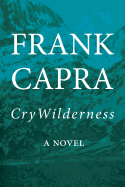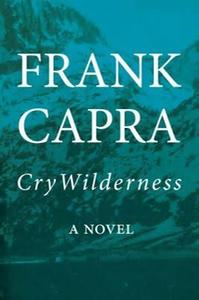
 Frank Capra was one of the most influential American filmmakers in the 20th century. Movies such as It's a Wonderful Life and Mr. Smith Goes to Washington are still celebrated 80 years after their release, and books like Five Came Back have chronicled his role in creating propaganda movies during the Second World War.
Frank Capra was one of the most influential American filmmakers in the 20th century. Movies such as It's a Wonderful Life and Mr. Smith Goes to Washington are still celebrated 80 years after their release, and books like Five Came Back have chronicled his role in creating propaganda movies during the Second World War.But in the mid-'60s, Capra wrote a novel and never released it. Some 50 years later, Rare Bird Books is publishing Cry Wilderness, a funny, sometimes brutal take on small towns, nature and what it means to be free. The narrator is Capra himself, presenting this tale as a (somewhat) plausible shaggy dog story about the community of Mono County, Calif., where he has a vacation home. Somewhere in the wilderness are two vagrants, Dry Rot and Bear Bait, who live off the land and the charity of others. When the businessmen of Mono aim to run the two out of the county, a policeman refuses to do the deed, leading to a legal battle inside the municipality with Capra as a major actor and witness. Cry Wilderness moves along like a farce, until its end, where Capra pulls the rug out from under the reader, showing how deathly serious his intentions are. It's a surprisingly assured book from a man who wrote only one.
Cry Wilderness has a wonderfully conversational style, as if the reader has dropped in for dinner with Capra and his wife, Lu (also a character). He waxes poetic about the incredible natural landscape of Mono, liberally quoting John Muir and Mark Twain, and his dialogue is as snappy and earnest as the best of his films. But there's a dark tinge to everything as well. Capra is under no illusions that the businessmen of Mono County won't get their way, and that his beloved wilderness will grow less and less wild over time.
This all makes Cry Wilderness far more than it seems at first. Capra's laid-back style and natural musings, combined with his farcical plot, lull the reader into thinking that the book is more aesthetic than grounded. But Dry Rot and Bear Bait aren't archetypes. They are men with secrets and motives of their own, and Capra depicts how the fight over their right to live in Mono County ignores their individualism for the sake of a larger political battle. Capra sees how the delicate balance between man and nature is constantly wobbling, and that the freedom of men to thrive and of nature to endure is in fact one and the same. --Noah Cruickshank, adult engagement manager, the Field Museum, Chicago, Ill.
Shelf Talker: The only novel by American filmmaker Frank Capra is a funny, thoughtful look at man's relationship to nature.

